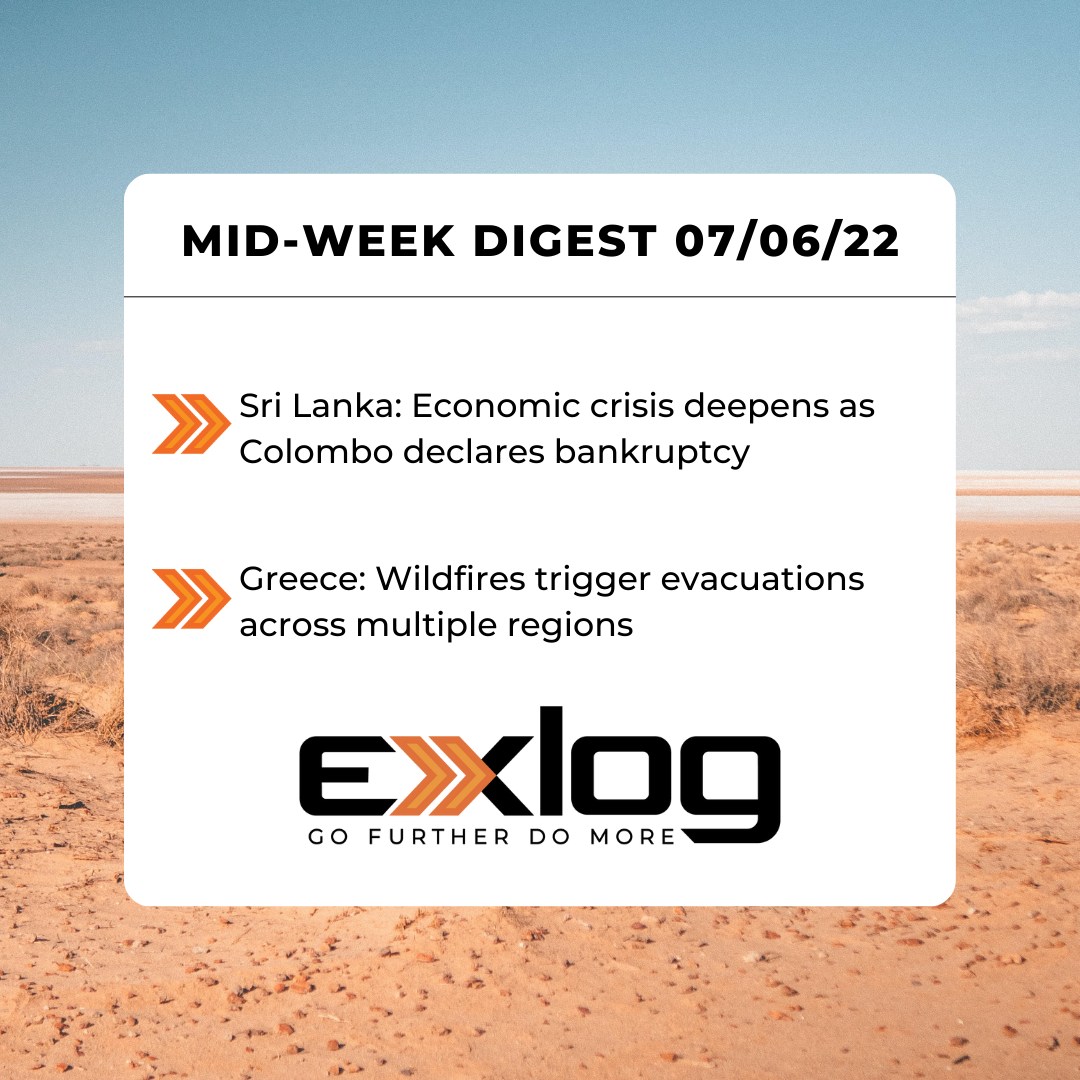Worsening Economic Crisis in Sri Lanka and Wildfires in Greece
Sri Lanka: Economic Crisis Deepens as Colombo Declares Bankruptcy
Civil unrest and commodity shortages persist in Sri Lanka as Prime Minister Ranil Wickremesinghe declared the country bankrupt on July 5, which will likely aggravate the humanitarian crisis and complicate the ongoing negotiations with the International Monetary Fund (IMF). Power and energy minister Kanchana Wijesekera announced on July 3 that Sri Lanka’s petrol reserves dropped to approximately 4,000 tons – below one day’s worth of consumption. All non-essential government institutions and schools have been closed until July 10 to curb commuting as only 20% of public transportation remains operational. Last week, Sri Lanka announced a two-week halt to fuel sales, reserving petrol and diesel for essential services and emergencies. Long lines at fuel stations have persisted, leading to disorder and sporadic clashes. Fuel shortages have also resulted in power cuts of up to three hours a day, adding to popular discontent. The economic crisis has triggered widespread anti-government protests marked by travel disruptions, looting, arson attacks and casualties in recent months, as President Gotabaya Rajapaksa has been widely accused of corruption and economic mismanagement. One of the most recent incidents of civil unrest occurred outside of the President’s residence in Colombo on July 6; security forces arrested seven people – including former parliamentarian Hirunika Premachandara – for participating in the rally. In an effort to address the shortages, Sri Lankan officials are negotiating shipments of essential goods and fuel with China, India, Russia and Malaysia. According to the Prime Minister, petrol shortages will likely last until July 22 when the first shipment of oil is expected to reach Sri Lanka, although 40,000 metric tons of diesel is anticipated to arrive on July 8. Increased security presence in the vicinity of government buildings and fuel stations is likely in the coming weeks, and protests – possibly accompanied by clashes over limited supplies – are expected to continue in the short term.
Greece: Wildfires Trigger Evacuations Across Multiple Regions
At least 65 wildfires have erupted in Greece since July 4, threatening local economies and prompting evacuations from coastal towns and tourist destinations – including seaside resorts in Itea, Kranidi and Dilesi. While the primary impact has been in Attica, Western and Central Greece, and the Peloponnese region, several wildfires have also been recorded on the islands of Crete and Kea. Authorities have issued warnings to residents of other islands and urged all citizens to avoid hazardous open-air activities. As of July 6, no casualties have been reported, and the full extent of the economic impact and property destruction remains unclear. Greece has developed effective wildfire evacuation and surveillance policies in response to sharp criticism following last year’s heatwave and resulting wildfires that destroyed 300,000 acres (121,000 hectares) of forest and bushland across the county. Ground and aerial firefighting forces have been deployed to the affected areas, and several EU countries – including Bulgaria, Romania, Norway, Finland, France, and Germany – have sent fire brigades to assist in mitigating the effects of the wildfire season that runs between May-October. As extreme temperatures and high-winds persist, the threat of wildfires spreading to other regions remains high. Additional property and infrastructure damage, as well as evacuation orders, are likely in the near term.


